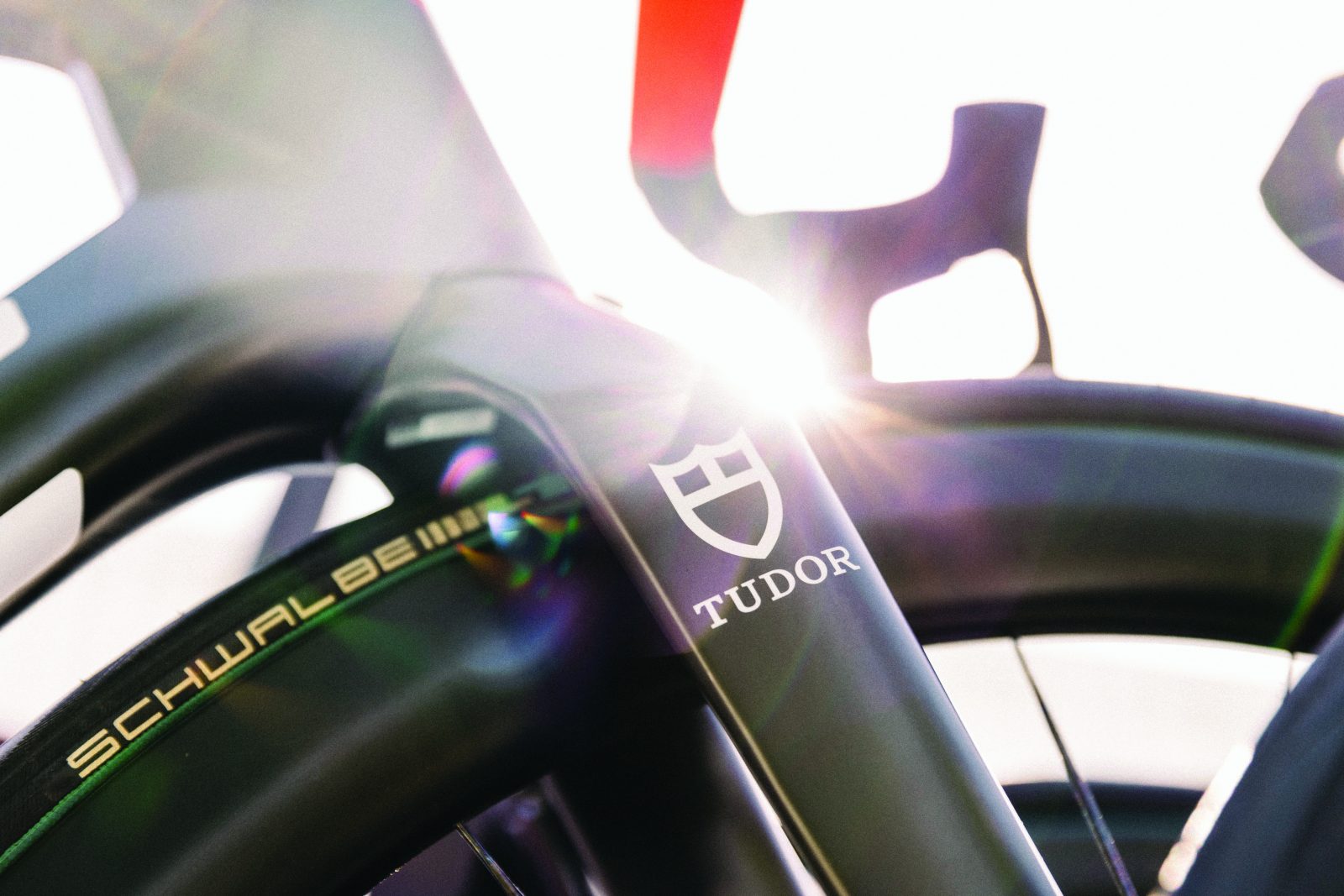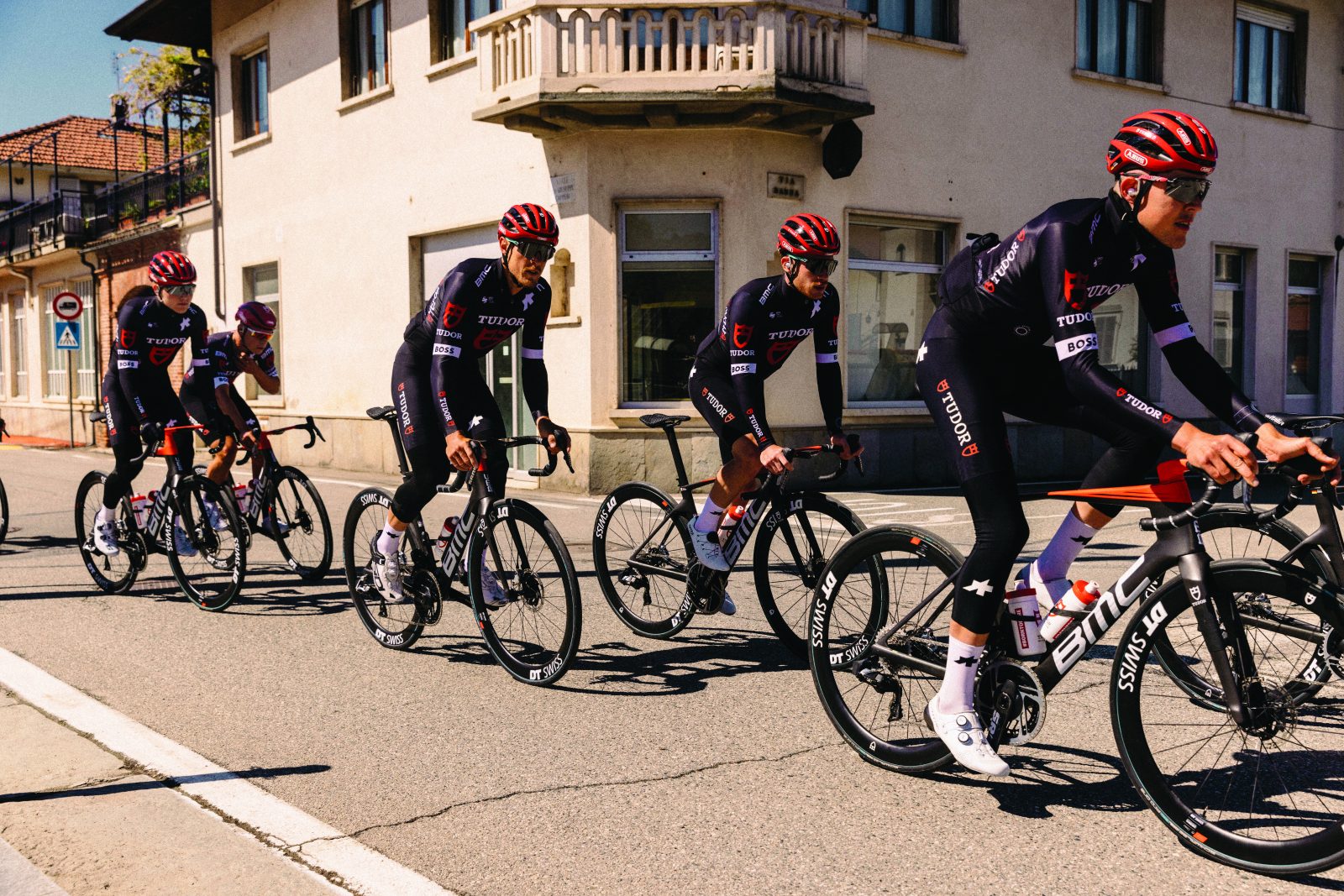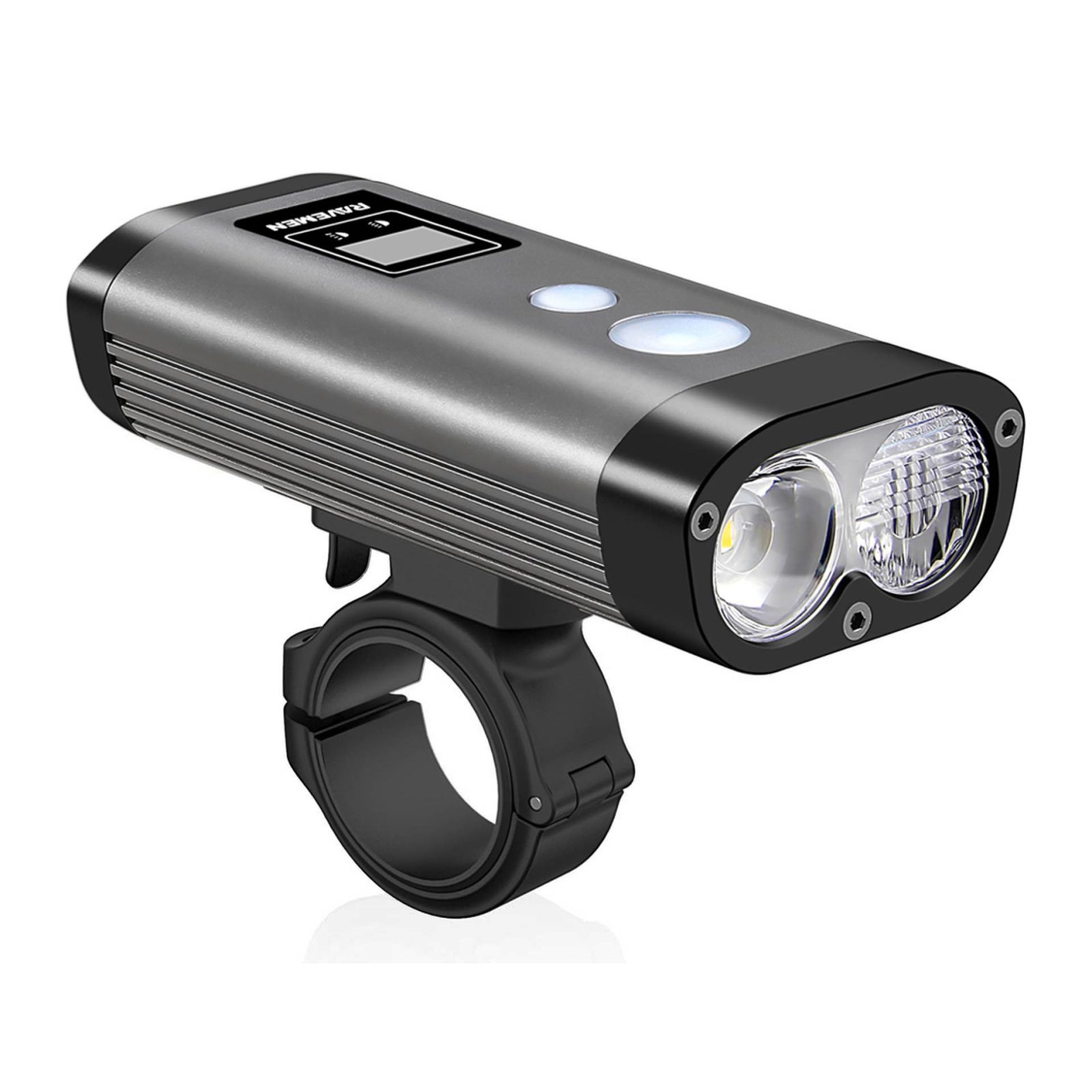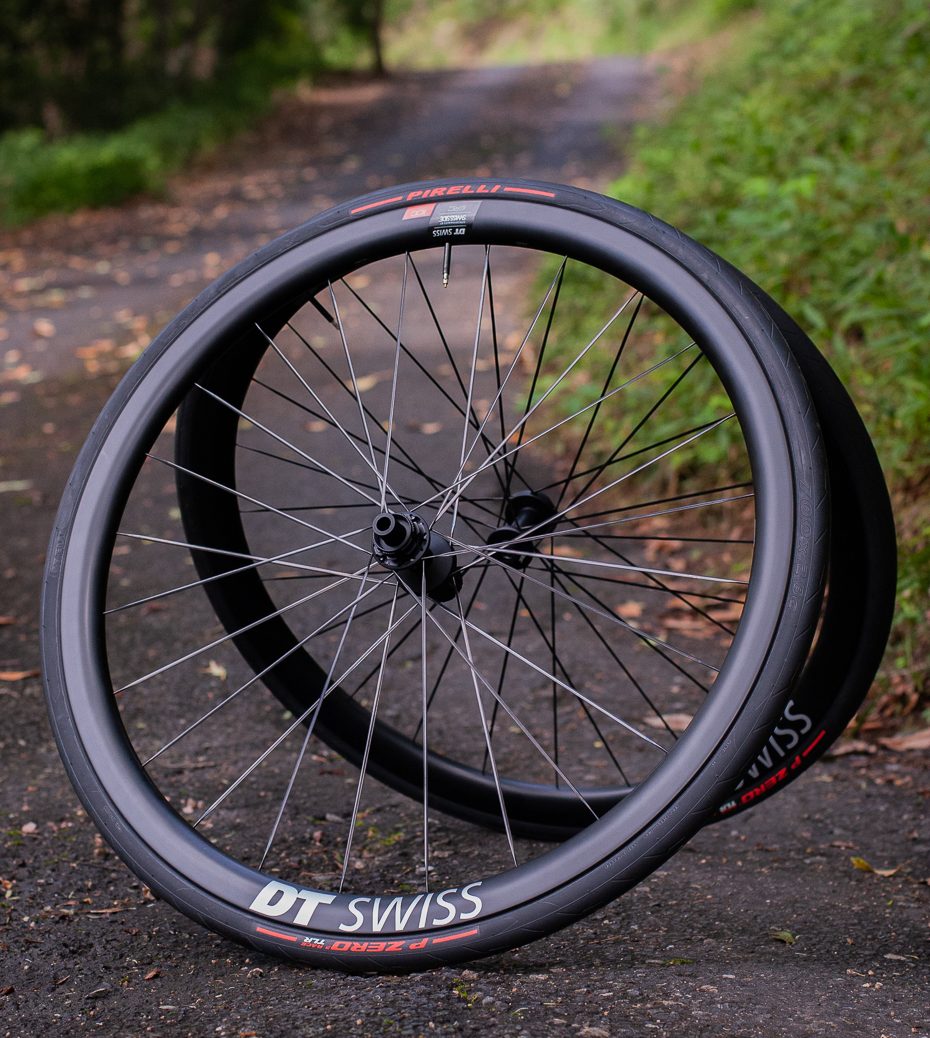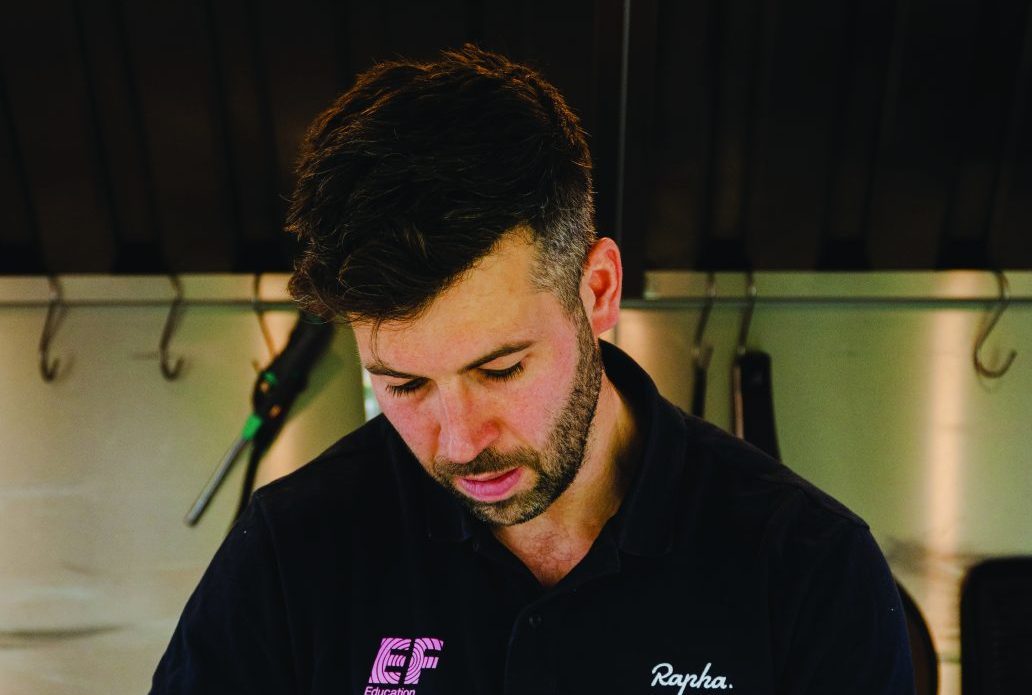What’s life like for a pro team making its debut at a Grand Tour? Cyclist joins Tudor Pro Cycling at the Giro d’Italia to find out
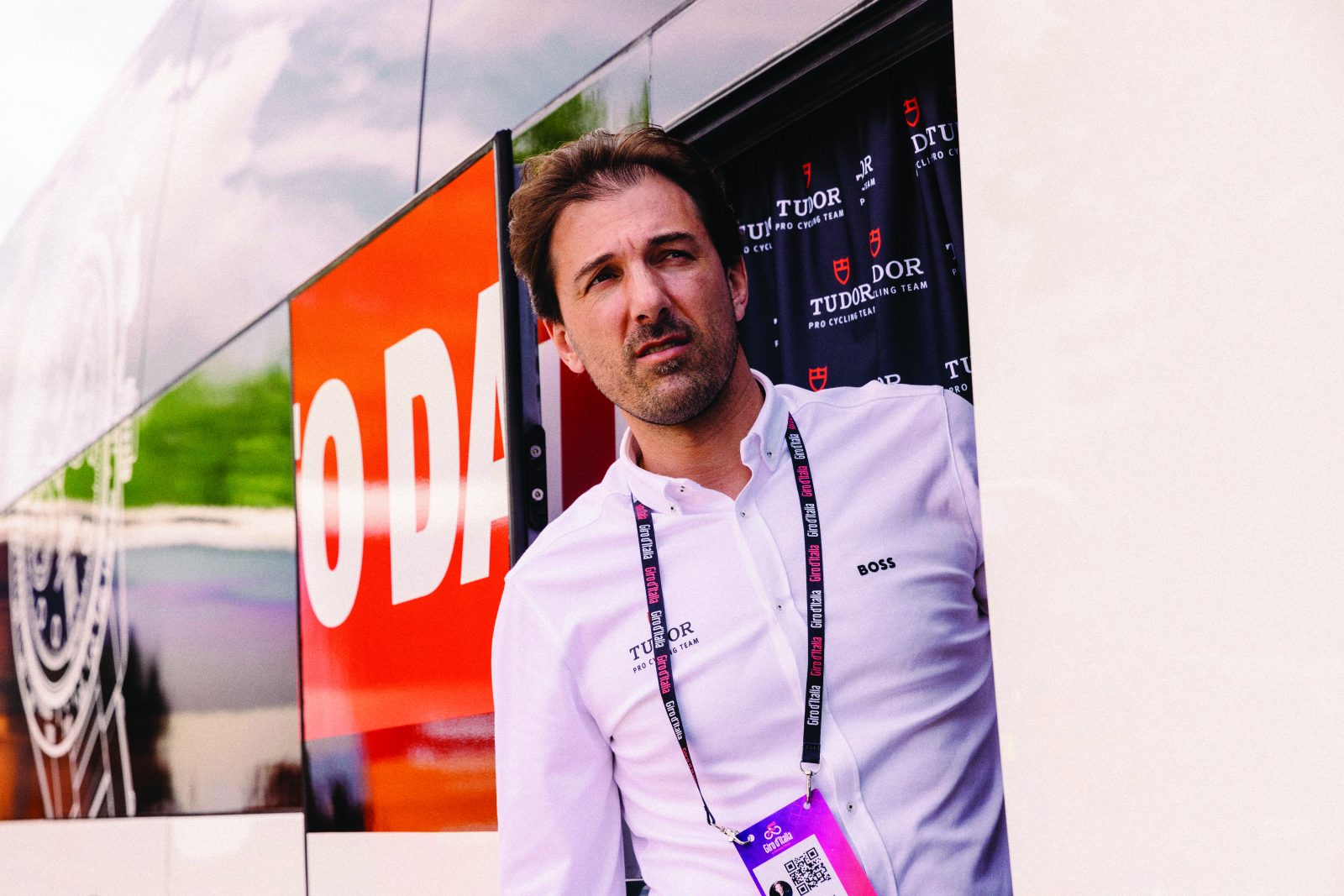
Words: Andy McGrath Photography: David Powell
Electricity fills the air as sports director Matteo Tosatto delivers his pre-Giro d’Italia race briefing. ‘Focus. Stay together. The big objective for us is a win,’ he says. Tudor Pro Cycling’s eight riders are hanging on his every word as he brings up a projected map of the 2024 Giro route and runs through the key stages and stats: 44,650m of elevation, 7,000m down on the previous year. Piece of cake, then.
This is Tudor Pro Cycling’s first Grand Tour. Looking around the hotel meeting room, there are Grand Tour veterans and debutants. Matteo Trentin is a stage winner in all three Grand Tours and is about to embark on his 13th in total. Robin Froidevaux is completely new to this. Tosatto says there are eight bunch sprint opportunities in the 2024 Giro, and they are their best eight chances for a win.
The team may be here at the race organiser’s discretion as a wild card invitation, but they haven’t turned up just to show off the sponsor’s name in doomed breakaways. Their style of racing aims to live up to their marketing tagline: Born to Dare. Besides, team owner Fabian Cancellara didn’t strive for mid-pack anonymity during his own career.
This race is the next step for one of the sport’s most ambitious up-and-coming squads. A ProTeam in the sport’s second tier since 2023, Tudor Pro Cycling have been making waves in the WorldTour this year, winning a bunch sprint with Arvid de Kleijn at Paris-Nice and the Tour de Romandie prologue with Maikel Zijlaard. After Tosatto finishes, head of sports Ricardo Scheidecker stands up. Formerly of Leopard-Trek and QuickStep, the Portuguese motivates, plans and leads from the shadows. He doesn’t give many interviews – he’s a doer rather than a talker – but Trentin calls him the ‘engine’ of the squad.
‘We don’t have any stars, but we don’t need any stars. We showed that already this first part of the season,’ Scheidecker says. ‘The Giro is gonna be fucking tough. But these are the moments where unity helps us to move forward. ‘If you’re here, it’s because you have character,’ he adds. ‘We are the underdogs, we always keep a low profile. When it’s tough, we keep our calm. We’re gonna mess up one, two, three sprints. That can happen, but you have to believe.’
The selected riders have spent three weeks training at altitude at Sierra Nevada. They’ve ridden through a deluge on stage at the team presentation. They’re wearing new Tudor watches, the just-released Pelagos FXD Chrono ‘Cycling Edition’. They know this is a seismic moment in the team’s brief existence so far. The team’s CEO, Raphael Meyer, built like a human greyhound, skinny and bequiffed, delivers an emotive final flourish: ‘When we speak about belief and the will to do something great, today we can. And as many of you knew when we first thought about the Giro, it was about bringing someone who now looks down on us,’ he says. ‘We’re also here for Gino.’
Yes, the promising Swiss stage racer Gino Mäder was set to join and lead the team in 2024 before his death in a crash at the Tour de Suisse in June 2023. ‘He would have been here and he’s proud up there. He’s proud,’ Meyer says. The room erupts into applause.
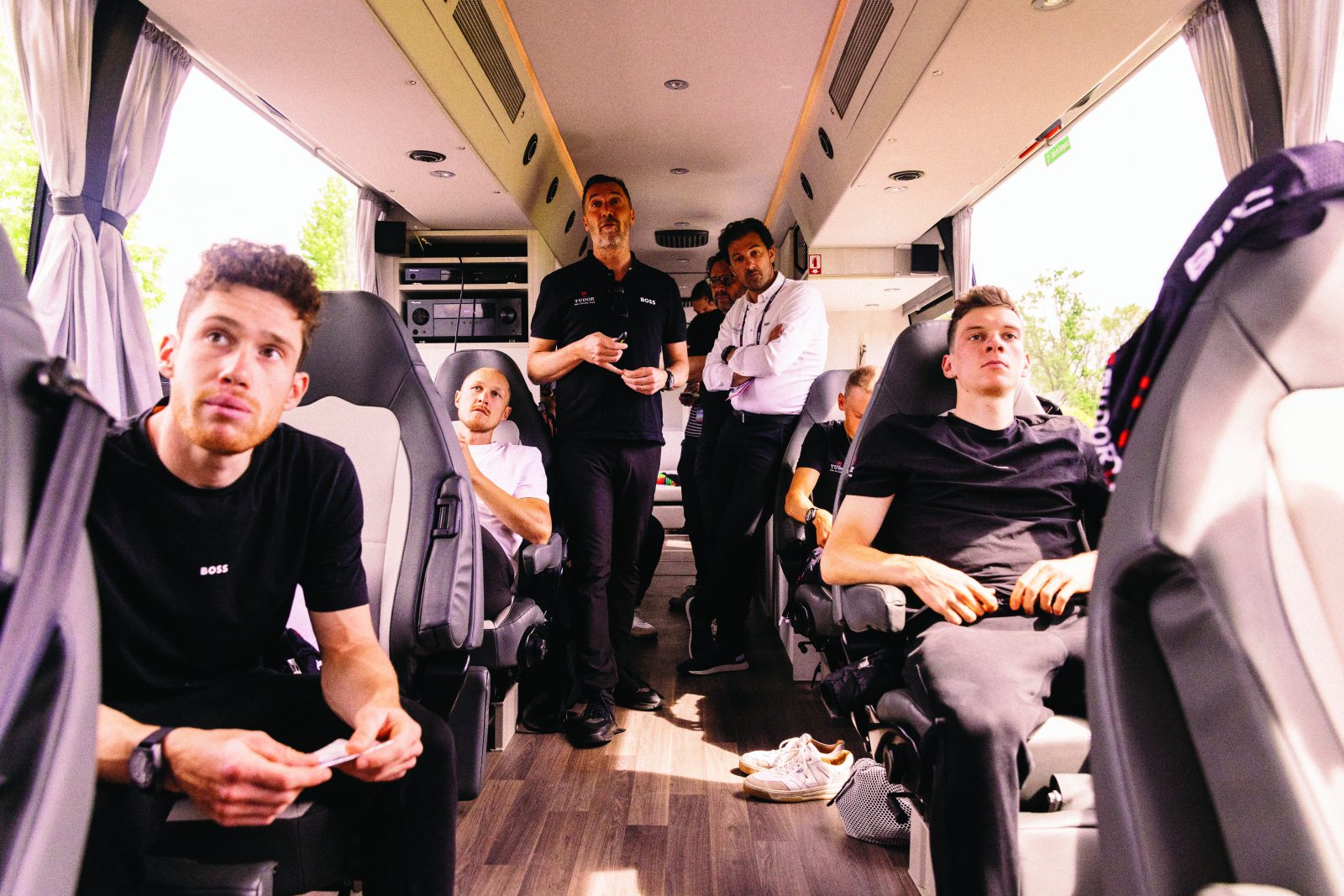
A team with time on its hands
When Cyclist sits down for breakfast on the eve of the Giro in Tudor’s Turin hotel, the team’s press officer asks me how our car is. ‘It’s OK, just an Opel, nothing special,’ we reply at the curious opening gambit. That wasn’t what she meant. It transpires that Tudor Pro Cycling had three cars broken into in the hotel car park overnight, including Cancellara’s Mercedes. Cue a trip to the police station and precious time spent sourcing replacement glass. So much for a warm Giro d’Italia welcome.
The team started life humbly as Continental outfit Swiss Racing Academy, which Cancellara took over at the end of 2020, unwilling to see 16 riders’ dreams destroyed when it looked like the team might fold. Watchmaker Tudor’s involvement then upscaled the project and the scope of its ambitions.
Tudor, part of the same Swiss company as Rolex, is a global brand with links to the All Blacks rugby team, Alinghi in sailing, and David Beckham (in his pre-race meeting, Meyer told the riders that they are all David Beckhams). The money the watch brand brings to the team means they now have the spending power to attract riders of the calibre of Trentin, Alberto Dainese and potentially Marc Hirschi, with whom they have been heavily linked for 2025. Meyer won’t be drawn on their budget: ‘We behave like Tudor in this: we don’t speak about time and money. We have time and a little money,’ he says.
According to Meyer, the team’s motto – ‘Swiss, Human, Performance’ – is about building not just physically better cyclists, but also better people. That means working on communication skills and having open dialogue around success and failure. ‘It’s not about being in a comfort zone and happiness, but still a bit,’ Meyer says. One of his Giro goals is to avoid any ego trips or fights.
This is a team with a WorldTour mindset, ambition and backroom experience thanks to staff additions such as Scheidecker, ex-Ineos Grenadiers data scientist Teun van Erp and mechanic Christophe Desimpelaere. ‘In year one, we spent more on salaries for staff than riders,’ Meyer says. ‘This probably never happened in a cycling team before. Why? Because we set the foundations to be right. Riders come and go, but the staff remain.’
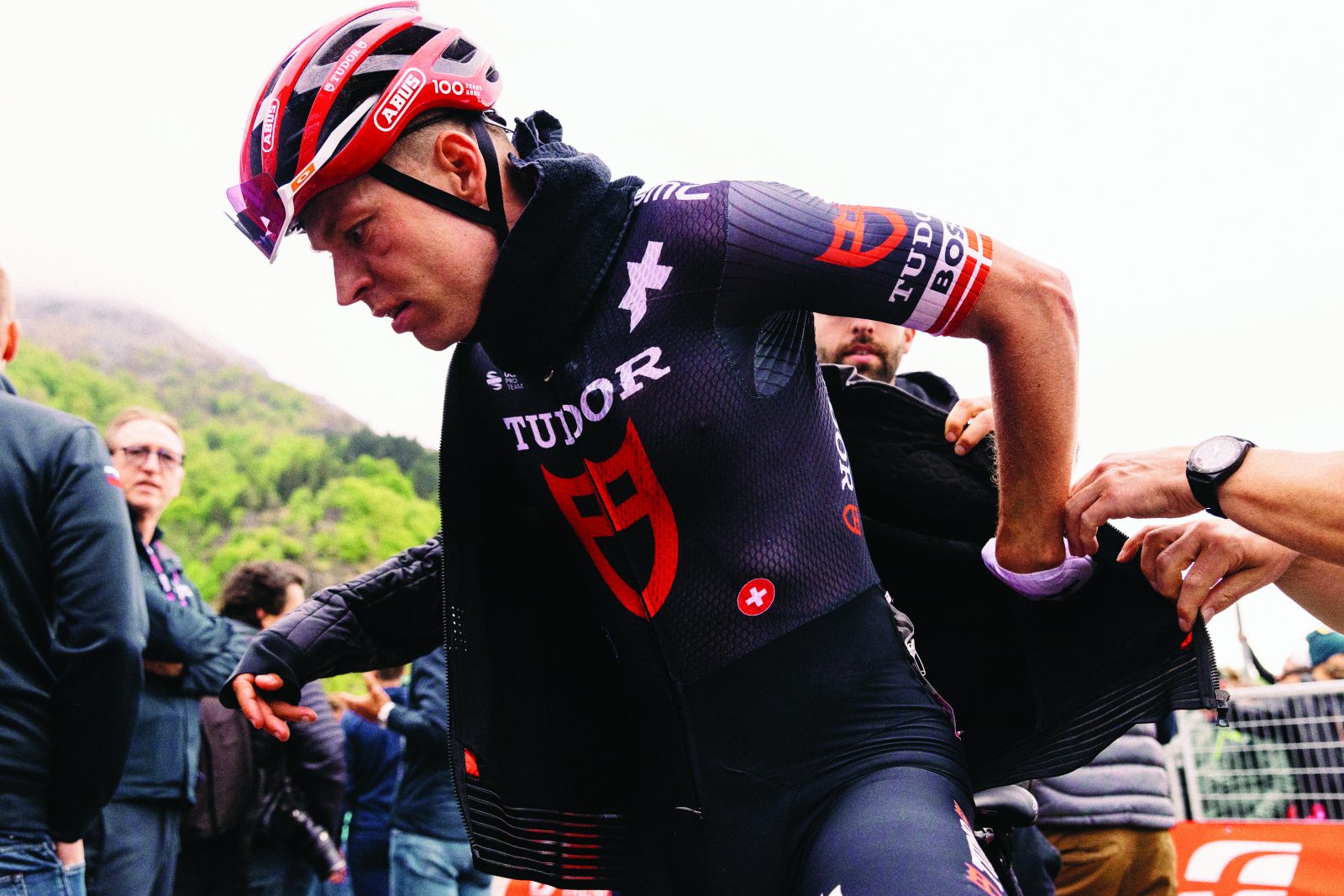
Its a marathon, and also a sprint
Four of the squad’s eight new riders in 2024 came from Dutch team DSM-Firmenich PostNL, including Dainese. A lot of their hopes for the Giro depend on the Italian, who has proven he can get over the mountains better than many rival fast men, which he translated into Giro stage wins in 2022 and 2023, as well as a stage win at the Vuelta in 2023.
Despite WorldTour interest, Dainese says joining Tudor is ‘a step up, not a step down’. However, his spring campaign was blighted by a February training crash, which saw him break teeth and damage his jaw. Injured riders can easily be forgotten in the cut and thrust of the cycling season. ‘I had a similar crash in 2022 and I felt so lonely. You only see the physio every day for rehab,’ he says. This year’s injury kept him away from racing for two months, but he was heartened by Tudor’s pastoral care, receiving regular calls from colleagues, be it his coach, the team doctor, fellow riders or sports directors.
Given the unparalleled support of a leadout train shaped around him, Dainese admits he’s feeling the pressure to perform before the Giro. ‘The winning process is hard in cycling,’ road captain Trentin says. ‘Eight of the last 10 Monuments were won by two guys. It’s dominated by a few actors, and you need to be good enough to sneak around them.’ Bunch sprinting has moved on since Trentin was part of Marcel Kittel’s leadout at QuickStep.
‘There’s more stress because of the level of the bunch. You need to increase your gearing, but the system is about timing, position, picking the right side of the road. It’s crazy because it takes a lot of time for a decision that takes seconds,’ he says. There’s a sweet spot between moving into place too late and burning out too early, says final leadout man Froidevaux: ‘One of the really important things is staying calm. Even though it’s a moment of chaos, it takes one bad choice to ruin everything.’
If Tour de France stage winner Trentin, signed from UAE Team Emirates, shows the scale of Tudor Pro Cycling’s ambition, 25-year-old Grand Tour debutant Froidevaux is a sign of their continuity and rider development. He was part of the Swiss Racing Academy squad when it was upscaled to Tudor in 2022. ‘I was expecting it to change, to grow, but not this much, this fast and this well,’ Froidevaux says. ‘Last year the lineup was mainly riders who were under the radar or unknown. And we won quite a lot of races.’
Thoroughbred sprinter De Kleijn led the way for the team with six victories, including Milano-Torino and a stage of the Deutschland Tour.
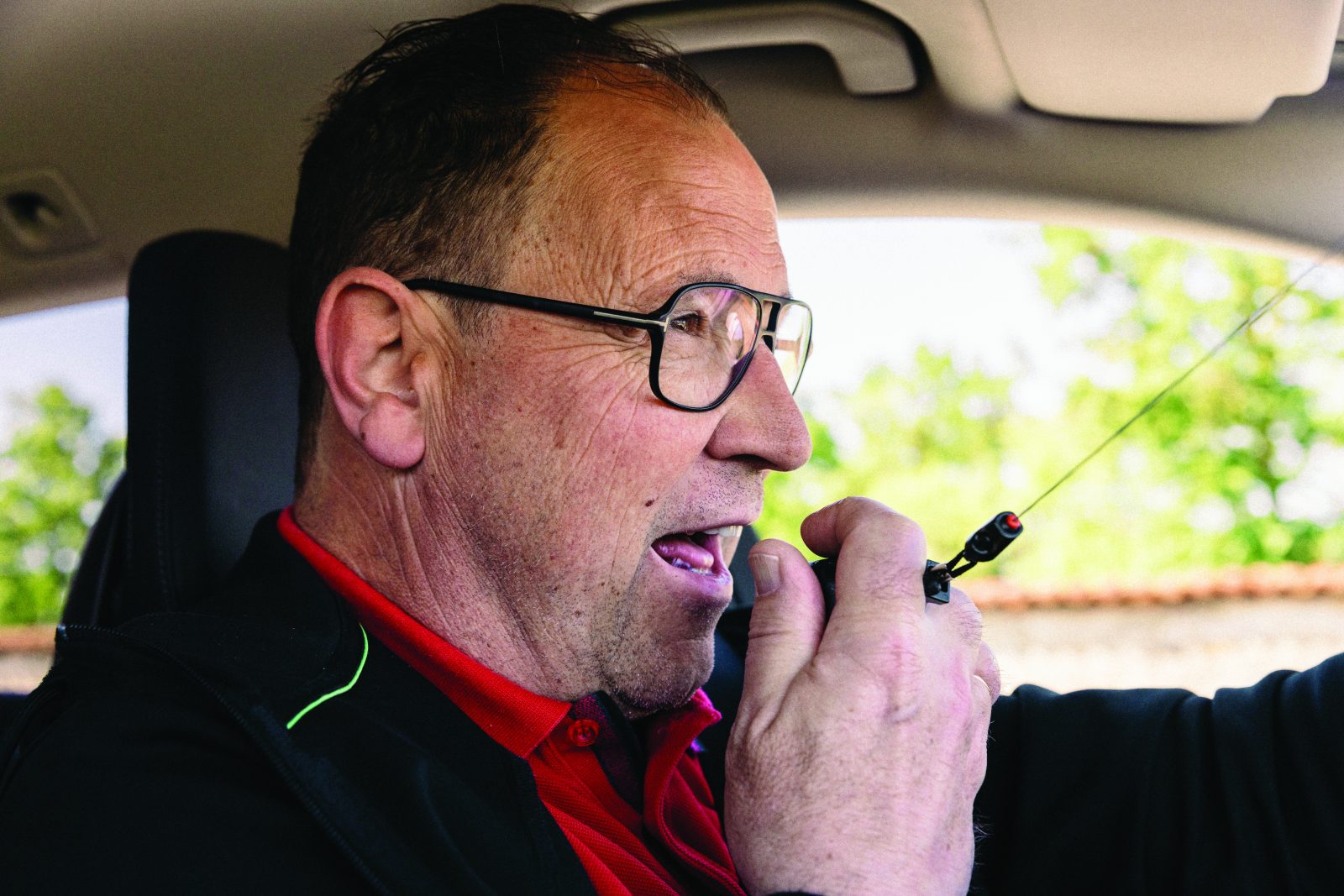
A winner’s approach to losing
The Giro’s first two stages come and go without much attacking intent. While Tadej Pogačar goes on the rampage, Tudor’s riders save energy for the bunch sprints, although Tudor’s Michael Storer attacks on the way to sixth at Santuario di Oropa, his best finish of the race. It’s the start of a resurgent showing from the Western Australian climber. Stage 3 between Novara and Fossano is their first real opportunity for success. It’s a flat finish with a stubborn, short rise in the finale. Inside the team bus, the tension is palpable as the team’s top brass watch the tightly-packed riders approach the finish.
‘We have to be in the second row,’ Scheidecker growls. The wild card team are well-marshalled, vying with Lidl-Trek and Alpecin for position. For a few moments in the finale, a fairytale victory looks distinctly possible. ‘Go Daino!’ bellows Tudor head of innovation Kurt Bergin-Taylor, up on his feet with Meyer. Dainese looks poised, but doesn’t pull the trigger and ends up being swamped by his rivals. Minutes later, the Italian sits dejectedly on the bottom step of the team bus, his jersey unzipped.
Only just audible above the hum of the team bus generator, German domestique Alexander Krieger say to a directeur sportif, ‘We have to stop making the same mistakes.’ It turns out to be the story of their Giro: close, but no Prosecco. Fast forward three weeks to the end of the race and Dainese’s best finishes are a couple of fourth places, as Jonathan Milan (Lidl-Trek) and Tim Merlier (Soudal-QuickStep) take the lion’s share of flat stage wins from a competitive field. After losing crash victim Krieger and Marius Mayrhofer mid-race, Tudor’s sprint train no longer functions at optimum efficiency.
Post-race, Cyclist asks Meyer what Krieger had meant about mistakes. ‘What he was referring to, for me, was mostly lacking trust in the group,’ Meyer says. ‘You make mistakes when you’re not used to something. On the positive side, a guy like Robin [Froidevaux], here from day one almost, finished his first Grand Tour never on the limits. It’s perfect proof that our way of working works.’
Storer also showed his prowess, saving his best for the final mountain stage and finishing 10th overall despite a nerve-inducing last day crash. ‘Not winning is also positive. It helps you keep motivation high,’ Meyer says. ‘So it was a great start to Grand Tour racing for Tudor Pro Cycling. It’s about knowing we can, that there is nothing that prevents us from doing even two Grand Tours in a year.’ That’s the goal for next year, he says. The Tour de France could be next.
At the Giro, Tudor Pro Cycling’s riders may have managed to reach Rome in three weeks but, as the saying goes, Rome wasn’t built in a day. So watch out for eye-catching transfer moves and bold racing; this could be only the beginning of the Tudor dynasty.
